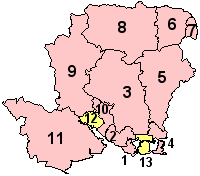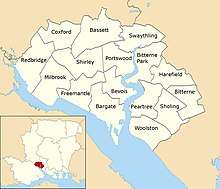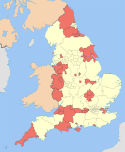Southampton City Council
Southampton City Council is the local authority of the city of Southampton. It is a unitary authority, having the powers of a non-metropolitan county and district council combined. It provides a full range of local government services including Council Tax billing, libraries, social services, processing planning applications, waste collection and disposal, and it is a local education authority. The council runs two municipal companies, 'CItizEN' a not-for-profit energy company and the 'Southampton Local Authority Trading Company', which covers various public services.
Southampton City Council | |
|---|---|
 Council logo | |
| Type | |
| Type | |
| History | |
| Founded | 1888[lower-alpha 1] |
| Leadership | |
Mayor of Southampton | |
Leader of the Council | |
Chief executive | Sandy Hopkins since 21 November 2018 |
| Structure | |
| Seats | 48 councillors |
 | |
Political groups |
|
| Elections | |
| First-past-the-post | |
Last election | 3 May 2018 2 May 2019 |
Next election | 6 May 2021 |
| Meeting place | |
 | |
| Southampton Civic Centre Southampton City Centre | |
| Website | |
| www | |
The council uses a leader and cabinet structure. Since 2012 the Labour Party has been in administration. The council is a member of the South East England Councils association and 'Key Cities', a lobby group.[3][4]
History

Southampton City Council has records in its archives of council meetings as early as 1199.[5] The Local Government Act 1888 established Southampton as a county borough of the county Hampshire, then officially known as the County of Southampton.[6] This meant that the city of Southampton had independent governance from the county.[7]
Local government restructuring with an act in 1973 made the City of Southampton a non-metropolitan district within the Hampshire county. It succeeded Hampshire County Council and became a Unitary Authority in April 1997 due to the 1992 Local Government Act.[8]
From 2000 to 2008 the council was under no overall control of any one party.[9] Though the Liberal Democrats supported a minority Conservative administration after the 2007 election,[10] in February 2008 the Lib Dems aligned with the Labour party to set a new budget.[11] The subsequent May 2008 election that year saw the Conservatives achieved a majority control of the council.[12]
Since the 2012 council election the Labour party re-took control of the city council, Mark Williams was council leader for a few months and resigned for behaviours that, according to an independent enquiry, "fell below national guidelines of openness and honesty in public life" after attempting to cover up the split of Coxford councillors Don Thomas and Keith Morrell from the Labour party.[13] He was replaced as council leader by Simon Letts 2013.[8][14] There have been two splits from the party whilst in a majority administration due to the implementation of austerity measures from central government: The two aforementioned Coxford councillors in 2013 who originally called themselves the 'Labour Councillors Against the Cuts' group,[15] and later known as 'Putting People First'; and Redbridge councillor Andrew Pope in 2015, who formed the Southampton Independents. In the 2018 election, both Simon Letts and leader of the Conservative group, Jeremy Moulton, both lost their seats.[16] Chris Hammond became the new leader of the council after the election.[2] In 2018 two municipal companies were set up by the council, 'CItizEN'[17] and the 'Southampton Local Authority Trading Company'.[18]
Powers and functions
The local authority derives its powers and functions from the Local Government Act 1972 and subsequent legislation. For the purposes of local government, Southampton is within a non-metropolitan area of England. As a unitary authority, Southampton City Council has the powers and functions of both a non-metropolitan county and district council combined. In its capacity as a district council it is a billing authority collecting Council Tax and business rates, it processes local planning applications, it is responsible for housing, waste collection and environmental health. In its capacity as a county council it is a local education authority, responsible for social services, libraries and waste disposal.
In August 2018 the council launched its own not-for-profit energy company 'CitizEn', created with the ambition to offer competitive rates for energy to tackle fuel poverty in the city.[17][19][20] The company was set up in cooperation with Nottingham City Council’s company Robin Hood Energy.[17] The council is currently in talks with Bournemouth, Christchurch and Poole Council for them to become a partner in the scheme.[21]
Local Authority Trading Company
In response to the 2008 financial crash and the Great Recession the then city council, under the administration of the Conservative Party, began a process of privatisation of council services.[22] From 2017 the Labour administration had begun a process taking municipal control of services that were privatised, so that all profits are reinvested into council services.[23] These services were set up and the Southampton "Local Authority Trading Company" (LATCo) was created.[24] Potential areas for the LATCo to cover include: street parking; public transport; adult and children’s transport; fleet services; housing management and operations; street cleansing; waste management; parks and open spaces; and facilities management.[25]
In 2018 the council began the process of incorporating services which Capita had provided for the council for 11 years, including "customer services, HR pay, revenues and benefits, procurement, health and safety, print, post room and IT services". This also includes the incorporation of 300 jobs under the Council's LATCo.[18][26]
Joint Committees
Southampton had sent a representative to the South East England Regional Assembly during its existence between 1998 and 2010. Created by the Regional Development Agencies Act 1998 and based in Guildford, the voluntary assembly met six times a year and was responsible for the South East England Development Agency, a project which oversaw investment projects in the south east region.[27] The council remains a member of the South East England Councils.
Solent Local Enterprise Partnership (LEP) is chaired by several businesses, universities and councils including Southampton City Council and primarily focuses on economic growth in the Hampshire region.[28] The Solent LEP's Growth Hub is based in Southampton.[29] There was an ambition to create a combined authority for the South Hampshire area, including Southampton, Portsmouth and the Isle of Wight which would include the potential for a combined authority mayor.[30] This program was controversial,[31] and was finally blocked by Hampshire County Council in 2017.[32] There continues to be interest in partnership between Southampton City Council, Eastleigh Borough Council and neighbouring components of other Hampshire districts (New Forest District Council and Test Valley Borough Council).[33][34]
Southampton City Council is also a founding member of the 'Key Cities' group. It is a lobbying group of 24 other cities across Great Britain, formed in 2013, that lobbies the government for greater devolution and funding [35][36][37]
Political composition

There are 48 seats on the council, or 3 seats for each of the city's 16 wards.[38] The wards are:
For each election, a third of the council or one representative for each ward is elected for a term of four years. Over four years there are three elections and a fourth gap year. Since becoming a unitary authority in 1997 the party has been controlled by different parties:
| Party in control | Years | |
|---|---|---|
| Labour | 1997-2000 | |
| No overall control Labour minority administration | 2000-2003[9] | |
| No overall control Liberal Democrat minority administration | 2003-2007 | |
| No overall control Conservative minority administration | 2007-2008[10][11] | |
| Conservative | 2008-2012[12] | |
| Labour | 2012–present[14] | |
National referendums in Southampton
2011 Alternative Vote Referendum
On Thursday 5 May 2011 Southampton voted in the 2011 Alternative Vote referendum under the provisions of the Parliamentary Voting System and Constituencies Act 2011 where voters were asked to decide on the question "At present, the UK uses the "first past the post" system to elect MPs to the House of Commons. Should the "alternative vote" system be used instead?" by voting for either "Yes" or "No".
| Choice | Votes | % |
|---|---|---|
| 39,257 | 62.99 | |
| Yes | 23,062 | 37.01 |
| Valid votes | 62,319 | 99.41 |
| Invalid or blank votes | 380 | 0.61 |
| Total votes | 62,699 | 100.00 |
| Registered voters and turnout | 164,726 | 38.06 |
| Source: Electoral Commission | ||
| Yes: 23,062 (37.01%) |
No: 39,257 (62.99) | ||
| ▲ | |||
2016 EU Referendum
On Thursday 23 June 2016 Southampton voted in the 2016 EU Referendum under the provisions of the European Union Referendum Act 2015 where voters were asked to decide on the question "Should the United Kingdom remain a member of the European Union or leave the European Union?" by voting for either "Remain a member of the European Union" or "Leave the European Union". The result produced a "Leave" majority on a turnout of 68% across the city, lower than the national average of 72%.[39] The Labour MP for Southampton Test Alan Whitehead supported "remain", whilst Royston Smith the MP for Southampton Itchen supported "leave".
| United Kingdom European Union membership referendum, 2016 Southampton | |||
| Choice | Votes | % | |
|---|---|---|---|
| Leave the European Union | 57,927 | 53.80% | |
| Remain a member of the European Union | 49,738 | 46.19% | |
| Valid votes | 107,665 | 99.91% | |
| Invalid or blank votes | 110 | 0.1% | |
| Total votes | 107,772 | 100.00% | |
| Registered voters and turnout | 158,171 | 68.2% | |
| Leave: 57,927 (53.80%) |
Remain: 49,738 (46.19%) | ||
| ▲ | |||
References
- "The Mayor and Sheriff". Southampton City Council. Retrieved 21 June 2020.
- "Christopher Hammond chosen as Southampton council leader". BBC News. 14 May 2018. Retrieved 10 September 2018.
- "Oxford Joins Key Cities Group". Key Cities. Retrieved 27 June 2020.
- "Key Cities Group calls for support to boost post-Brexit economy". Government Business. Retrieved 27 June 2020.
- "Local authority records". Southampton City Council. Retrieved 2 June 2020.
- Mark Housby. "Highways - a history". Hampshire County Council. Retrieved 6 November 2018.
- "Borough". Encyclopædia Britannica. Retrieved 6 November 2018.
- Kieran Hyland (17 November 2016). "Your Guide to Southampton City Council". Wessex Scene. Retrieved 11 September 2018.
- "Vote 2002". BBC News. 5 May 2002. Retrieved 11 September 2018.
- "'Shock move' gives Tories power". BBC News Online. 17 May 2007. Retrieved 30 January 2011.
- "Tories lose city council control". BBC News. 21 February 2008. Retrieved 11 September 2018.
- "Tories seize power in Southampton". BBC News. 2 May 2008. Retrieved 11 September 2018.
- "Southampton council leader Richard Williams resigns after 'cover-up'". BBC News. 26 April 2013. Retrieved 11 September 2018.
- "Vote 2012 - Southampton". BBC News. 4 May 2012. Retrieved 10 September 2018.
- "Southampton City Council agrees £16m budget cut". BBC News. 13 February 2013. Retrieved 11 September 2018.
- "Labour and Tory leaders defeated in council elections". BBC. 4 May 2018. Retrieved 14 May 2018.
- "Southampton City Council launches own gas and electricity company today". Southern Daily Echo. 28 June 2018. Retrieved 28 July 2018.
- "Southampton staff affected as council ends Capita deal". BBC. 24 July 2018. Retrieved 6 September 2018.
- Orde, Tom (23 December 2019). "Energy firm helps keep Southampton residents warm and cosy this winter". Daily Echo. Retrieved 16 January 2020.
- Wray, Sarah (14 January 2020). "London Mayor launches green energy company, profits to go into community projects". Smart Cities World. Retrieved 16 January 2020.
- Josh Wright (5 November 2018). "Bournemouth could join Southampton's CitizEn Energy scheme". Bournemouth Echo. Retrieved 4 January 2019.
- Anna Bawden (25 June 2013). "Local government: a new era of co-operation". The Guardian. Retrieved 14 September 2018.
- Herpreet Kaur Grewal (30 August 2017). "SOUTHAMPTON CC POISED TO CREATE NEW TRADING ARM". FM World. Retrieved 6 September 2018.
- "Southampton moves ahead with waste trading arm". Lets Recycle. 18 September 2017. Retrieved 6 September 2018.
- "Southampton sets up trading company". Transport Xtra. 18 August 2017. Retrieved 6 September 2018.
- William Rimell (25 July 2018). "Southampton City Council opts to take raft of services in-house as it announces split from service provider Capita". Southern Daily Echo. Retrieved 6 September 2018.
- "South East England Regional Assembly website". Archived from the original on 28 May 2010. Retrieved 7 September 2018.
- Emma Streatfield (7 October 2015). "Solent Local Enterprise Partnership has put in a bid to create a new enterprise zone near Southampton Airport that could create 6,000 jobs". Southern Daily Echo. Newsquest. Retrieved 7 September 2018.
- Ryan Platt (21 August 2017). "#19 Starting a business in Southampton". Startups. Retrieved 7 September 2018.
- "New Solent authority 'secures £900m' from government". BBC News. 1 July 2016. Retrieved 7 September 2018.
- Duncan Geddes (16 November 2014). "Winchester could be split over plans to form a devolved super authority for south Hampshire". Hampshire Chronicle. Newsquest. Retrieved 7 September 2018.
- "Solent Combined Authority bid 'almost certainly dead'". BBC News. 26 January 2017. Retrieved 7 September 2018.
- Mitchell, Jonathan (19 November 2019). "Do the cities of South Hampshire deserve their own metro mayors? | CityMetric". City Metric. Retrieved 7 April 2020.
- "Transforming Cities Fund Call for Proposals: Southampton City Region" (PDF). Department For Transport. Retrieved 7 April 2020.
- Peter Box (27 June 2018). "Britain is full of powerful mid-sized cities. Let's unlock their potential". The Guardian. Retrieved 4 January 2019.
- "Key Cities announces four new members in growth drive to become authentic voice of urban Britain". Key Cities. 28 November 2018. Retrieved 4 January 2019.
- Imran Khan (29 November 2018). "UK's productivity puzzle: What can we learn from the UK's mid-sized cities?". Open Access Government. Retrieved 4 January 2019.
- "Elections and Referenda". Southampton City Council. Retrieved 31 January 2018.
- "EU referendum results". Electoral Commission. Retrieved 7 September 2018.
- Footnotes
- Established by the Local Government Act of 1888; was changed into a Unitary Authority in 1997
